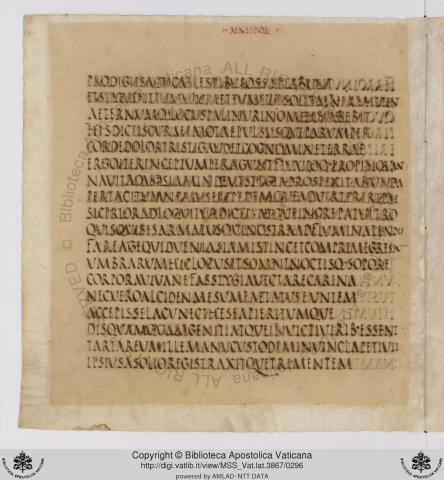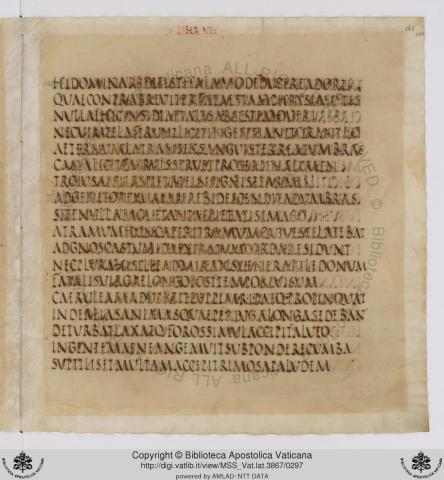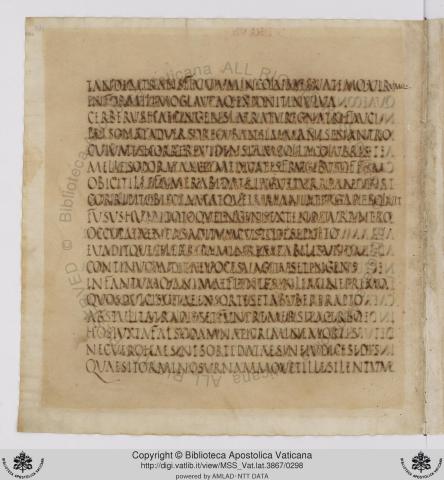Ergō iter inceptum peragunt fluviōque propinquant.
Nāvita quōs iam inde ut Stygiā prōspexit ab undā385
per tacitum nemus īre pedemque advertere rīpae,
sīc prior adgreditur dictīs atque increpat ultrō:
'Quisquis es, armātus quī nostra ad flūmina tendis,
fāre age, quid veniās, iam istinc et comprime gressum.
Umbrārum hic locus est, somnī noctisque sopōrae:390
corpora vīva nefās Stygiā vectāre carīnā.
Nec vērō Alcīdēn mē sum laetātus euntem
accēpisse lacū, nec Thēsea Pīrithoümque,
dīs quamquam genitī atque invictī vīribus essent.
Tartareum ille manū custōdem in vincla petīvit395
ipsius ā soliō rēgis trāxitque trementem;
hī dominam Dītis thalamō dēdūcere adortī.'
Quae contrā breviter fāta est Amphrӯsia vātēs:
'Nūllae hīc īnsidiae tālēs (absiste movērī),
nec vim tēla ferunt; licet ingēns iānitor antrō400
aeternum lātrāns exsanguēs terreat umbrās,
casta licet patruī servet Prōserpina līmen.
Trōïus Aenēās, pietāte īnsignis et armīs,
ad genitōrem īmās Erebī dēscendit ad umbrās.
Sī tē nūlla movet tantae pietātis imāgō,405
at rāmum hunc' (aperit rāmum quī veste latēbat)
'agnōscās.' Tumida ex īrā tum corda resīdunt;
nec plūra hīs. Ille admīrāns venerābile dōnum
fātālis virgae longō post tempore vīsum
caeruleam advertit puppim rīpaeque propinquat.410
Inde aliās animās, quae per iuga longa sedēbant,
dēturbat laxatque forōs; simul accipit alveō
ingentem Aenēān. Gemuit sub pondere cumba
sūtilis et multam accēpit rīmōsa palūdem.
Tandem trāns fluvium incolumēs vātemque virumque415
īnfōrmī līmō glaucāque expōnit in ulvā.
notes
Manuscripts: M 384-407, 408-416 | P 384-393, 394-416 | R 384-396, 397-414, 415-416
On the approach of Aeneas, Charon warns him to keep aloof from the bank, but at length, appeased by the words of the Sibyl, and by the sight of the golden branch, conveys them over the Styx (Frieze).
384: ergō…peragunt: “and so they proceed on the journey they had begun”; peragunt, literally “they are accomplishing” (Page); literally “they go through with,” here “continue” (P-H). flūviō: dative of place to which (poetic, AG 428h).
385: ut: = ut prīmum, “as soon as” (Chase). Stygiā ab undā: implies “from the midst of the stream” (Frieze); “from his post by the Stygian wave” (P-H). quōs: = eōs (connecting relative, AG 308f). nāvita…prōspexit: nāvita = Charōn (Carter). iam inde: perhaps best joined with prōspexit, “even then from that moment” (Frieze); “from where he was without waiting to get nearer”; cf. 389 iam istinc “there, from where you are” (Page).
386: īre: “going”; with prōspexit (Carter).
387: increpat ultrō: “upbraids them unprovoked” (Page); “unaddressed rebukes them” (Comstock); “at once rebukes them.” Ultrō implies that he does not wait for an explanation (F-B), “without provocation” (Carter); a stylistic variation of prior (Bennett).
388: armātus: Charon is alarmed at the appearance of an armed man, remembering the
disturbance formerly occasioned in Hades by the visits of Hercules, Theseus, and Pirithous (Frieze). nostra ad flūmina: observe his sense of ownership as ferryman (Carter).
389: fare age, quid veniās, iam istinc, et comprime gressum: “Come say why you come, just from where you are, and check your steps.” Note the disjointed vehemence of the line (Page); quid veniās, subjunctive in indirect question (AG 575). iam istinc: “from where you stand,” i.e. not another step! (Comstock); “even from where you are”; iste, istic, istinc, are demonstratives of the second person (F-B) (AG 146a).
390: somnī noctisque soporae: “of sleep and slumberous night”; note the assonance (Page). Sleep is mentioned as connected with death, and alien from active life, and so the epithet soporae (“drowsy” (F-B)), a somewhat uncommon word (Conington).
391: nefās: supply est (Pharr). vectāre: supply mē, as subject accusative (Carter). corpora vīva: as opposed to the shades which are sometimes called corpora (Conington).
392: Alcīdēn: Hercules as the last and greatest of his feats brought up Cerberus from the underworld (Page). nec sum laetātus: “I regretted sorely” (Bennett). According to Servius he was kept in chains for a year. According to the story, Charon was punished by a year’s imprisonment for assisting Hercules to enter Hades by ferrying him across the Styx. On the journey Hercules carried off Cerberus to the upper world (Page); litotes (Pharr). euntem: = venientem (Bennett) (literally, “going on his journey”) (G-K); “when he came” (Comstock).
393: accēpisse lacū: “to have welcomed on my pool” (Page); “that I received him on the water” (Frieze). The infinitive after verbs of emotion is common (Knapp). lacū, ablative of place where (Bennett). nec Thēsea Pirithoūmque: Theseus aided his friend Pirithous in an attempt to carry off Proserpina (Page).
394: dīs...genitī: Theseus was a son of Neptune, Pirithous of Jupiter (Frieze). invictī vīribus: “resistless in might”: my opposition to them would be vain (G-K). This phrase seems to refer to verse 392 above, as if Charon meant to say that though he could plead that his passengers were deserving from their divine descent, and further that he had no choice in the matter, as they were stronger than he, it did not avail to shield him from punishment (Conington). quamquam essent: The subjunctive is used as giving Charon’s thought, i.e. “though I knew them to be” (Comstock); “though they were of the favored few” (Knapp). Subjunctive in a concessive clause, mainly characteristic of poetry and later prose. In classical prose quamquam usually takes the indicative (AG 527) (Pharr).
395: Tartareum custōdem: “the watch-dog of Tartarus” (G-K), = Cerberus, whom Hercules was sent by Eurystheus to drag away (G-K). ille: “the former,” (= Alcidēs = Herculēs) (Pharr). manū in vinc(u)la petīvit: = petīvit manū ut caperet vinc(u)līs (Pharr): “sought to enchain by violence” (F-B); “brought him to chains from the throne of the king himself” (Bennett). In vincla, “to bind him” (Comstock).
396: ā soliō rēgis: rēgis = Plutōnis (F-B). When Hercules appeared, Cerberus fled for refuge to the throne of Pluto (Frieze). traxitque trementem: a forcible phrase, as showing how completely the attempt succeeded. We may suppose either that Cerberus broke his chain and fled to his master’s throne, or that Vergil followed some story which spoke of Cerberus as attached to Pluto’s throne, instead of placing him where he himself places him in 417 ff. (Conington). Trementem pictures the complete success of Hercules (Knapp).
397: hī: “the latter,” = Theseus and Pirithous (Pharr), the two forming one “party” (393) (Comstock). dominam…adortī: dominam = rēgīnam Prōserpīnam (F-B); adortī (= cōnātī), supply sunt (Comstock): “attempted to carry off (our) queen (Proserpina) from the chamber of Pluto” (Chase). Dītis: this genitive connects not with domina but rather with thalamō, “from the chamber of Dis.” The position of the words however seems to show that dominam and Dītis do go together, and surely “Pluto’s Queen” is good sense: her queenly dominion, however, is exercised not over Pluto but over the world below (Page).
398: Amphrӯsia vātēs: i.e., “the prophetess of Apollo,” because he tended the sheep of Admetus by the river Amphrysus in Thessaly (see Georgics 3.2) (Page).
399: īnsidiae: supply sunt (Carter). absiste movērī: absiste = nōlī (Comstock): “cease to be troubled” (Page).
400-401: licet: supply per nōs, “so far as we are concerned” (Pharr). ingēns iānitor…terreat animās: supply ut with terreat (Frieze). The subjunctive clause can be felt as one of result, “permission is given so that” (Knapp). “He may affright at his will” (Knapp), but we are not going to interfere (Carter). antrō: “in his den” (Chase), ablative of place where, supply in. aeternum: = in aeternum, “forever” (Carter). “The huge door-keeper may (for all we care) still with his everlasting howl scare the bloodless ghosts” (Page).
402: casta…līmen: casta is a predicate adjective with servet (Carter); the emphasis of the sentence is on this word (Bennett): “unassailed” (Bennett) or “chastely may Proserpina keep within her uncle’s threshold” (F-B); “Let Proserpina stay chaste within her uncle’s home” (P-H). The tone throughout is ironical (F-B). patruī: Proserpine was the daughter of Jupiter, brother of Pluto, her husband (Frieze). servet līmen: again supply ut (as with terreat) (Pharr): “cling to” (Knapp), in the sense of “stay within” (Frieze); “abide at home” (Bennett); “keeping within doors” was held with the Greeks and Romans to be a sign of chastity (casta) (Page); as Conington remarks, this expresses the ancient ideal of a good wife—domī mansit, lānam fēcit (“she stayed home and she made wool”) (P-H).
403: pietāte: carries the emphasis; Aeneas is as distinguished for his pietās as for his prowess; his present errand proves that (Knapp).
404: īmās ad umbrās: “to the shades below” (F-B).
405: nūlla: for nūllō modō (Comstock): “not at all,” an emphatic negative, common in conversational prose (F-B). pietātis imāgō: “the sight of goodness,” embodied in Aeneas (Conington); “the picture of such goodness” (F-B); “the thought of such great piety” (Carter).
406: at: “yet” (F-B); “still” (Comstock); after a conditional protasis (Conington).
407: agnoscās: jussive subjunctive (AG 439), probably in an imperative sense (Conington). Tumida ex īrā tum corda resīdunt: “his swollen breast subsides from anger” (Frieze); a metaphor from the sea, when a calm follows a storm (F-B).
408: nec plūra hīs: supply verbīs dicta sunt. The idea is “nor were further words needed” (Knapp); “no more than this (was said)” (Comstock), with hīs taken as an ablative of comparison (AG 406); Charon is mollified, and does not reply (Conington). dōnum: i.e., for Proserpina (Pharr).
409: fātālis virgae: “the branch of fate” because it served as the token that he had been called by the fates to Hades (Frieze); “the fateful wand” (F-B). It is scarcely likely that Hercules or Theseus was represented as having come with the bough, as Charon seems to say that they prevailed by other means, and that the consequences were accordingly disastrous (Conington). Fātālis is explained by line 147, sī tē fāta vocant (F-B), because fate decreed that it alone could propitiate the infernal powers (H-M). longō post tempore vīsum: “seen (now) after a long time” (Frieze); “so long unseen”; the expression implies that the golden bough had been used before to gain an entrance to the lower world. Whether Vergil has some such tradition in view we do not know (F-B). Tempore is ablative of degree of difference (AG 414) (Comstock).
410: caeruleam: = ferrugineam (303) (Conington). advertit: i.e., toward Aeneas and the Sibyl (Bennett).
411: aliās animās: “the other ghosts,” not classing Aeneas as a ghost, but putting Aeneas on one side and the ghosts in contrast on the other (Page). This idiom in Greek and Latin, including among a number of persons or things the one who is distinguished from them, is often untranslatable except by an adverb (“besides” etc.) (P-H). per iuga longa: iuga = transtra (Knapp); the benches in the boat (Carter); “the rowers’ benches” (P-H); “scattered about the long benches” (Bennett).
412: dēturbat: a hard word, “routs out” (F-B). laxat forōs: “clears the gangways” (G-K); “opens up the hatches,” here, the boat (Frieze). alveō: of the hollow of the boat. Note the synizesis of the final two syllables (Conington).
413: ingentem: the form of the hero is great and ponderous, in contrast with the frail structure of the boat and its ordinary passengers (Frieze). We are occasionally reminded by Vergil of Aeneas’ size; here the contrast between the “gigantic” hero and the shades whose place he takes and its effects on the boat are rather grotesque (Conington). gemuit sub pondere: a realistic touch, the passage being in lighter tone than the rest. Aeneas was no unsubstantial umbra, but a living person, and ingēns at that (F-B).
414: sūtilis: “being frail” (Bennett), “patched” (P-H), “seamy”; properly “stitched,” emphasis given the word by its position (F-B). The boat was made either of reeds sewn together, or of a frame covered over with hides which were sewn together over a wooden frame (Frieze). rīmōsa: “through its chinks” (F-B). Not bearing the weight and strain of a body of flesh and blood, the seams start opening in cracks like those of the ships strained by the waves (cf. 1.122, rīmīs fatiscunt, “they gape open with cracks” (Frieze). accipit palūdem: palūdem = palūdis aquam (Frieze); “the (water of the) marsh (Pharr); “let in a flood of water” (Comstock). This is reminiscent of 1.122, accipiunt inimīcum imbrem (“they take on the hostile rain”) (Conington).
415: incolumēs: “safe and sound”; used predicatively with the accusatives vātem and virum (F-B)
416: glaucā ulvā: “gray sedge” (F-B); “gray” because sunshine is lacking (Comstock). Naturally no green thing could be found in the place of shades (G-K). expōnit: “lands” (Comstock). in: to be taken with both līmō and ulvā; such dislocations of words are common in poetry (G-K).
vocabulary
peragō, ēgī, āctus, 3, a.: to drive through; carry through; execute, achieve, accomplish, finish, perform, 4.653; pursue, 6.384; fulfill, achieve, 3.493; go through with, distribute, 5.362; go through mentally, 6.105.
fluvius, iī, m.: a stream; river, 1.607; water, fountains, abundant water; secundō fluviō, by the favoring stream, with or down the stream, 7.494. (fluō)
propinquō, āvī, ātus, 1, a. and n.: to bring near; render favorable, 10.254; to draw near, approach, w. dat., 2.730, et al. (propinquus)
nauta, ae, m.: a boatman, ferryman, 6.315; sailor, mariner, 3.207. (nāvis)
Stygius, a, um: adj. (Styx), pertaining to the Styx; of Hades; Stygian, 4.638, et al.
prōspiciō, spexī, spectus, 3, n. and a.: to look forth, forward; to see afar, in the distance, descry, see, 3.648; to look forth or out upon, w. dat., 1.127. (prō and speciō, look)
aggredior, gressus sum, 3, dep. n. and a.: attempt, dare, with inf., 2.165; to advance toward; attempt, 3.38; attack, 9.325; assail, hew, 2.463; accost, address, 3.358. (ad and gradior)
dictum, ī, n.: a thing said; word, 1.197; command, precept, injunction, 1.695; promise, 8.643. (dīcō)
increpō, uī, itus, rarely āvī, ātus, 1, n. and a.: to make a noise or din; resound, 8.527; clash, 12.332; snap, 12.755; (fig.), chide, blame, reprimand, 6.387; taunt, 9.560; (w. cognate acc.), utter, 9.504.
ultrō: (adv.), to the farther side; furthermore, over and above, moreover, 2.145, et al.; even, 9.127; beyond the limit of necessity; uncompelled, unasked, unimpelled; apart from all external influences, of one's self, of one's own accord or motion, voluntarily, willingly; unprompted by any words on another's part, first, 2.372; 4.304; unaddressed, 10.606; promptly, 10.282; impetuously, 12.3. (cf. ulterior)
armātus, a, um: armed, charged, 12.857. (armō)
age, agite: (imperat. of ago), onward! away! come on!
veniō, vēnī, ventus: to come, freq.; come forth; approach, 6.755; rise, appear, 1.353; dawn, 10.241; to present one's self or itself, 5.344; descend, spring from, 5.373; impers., ventum est, we, they came or have come, 4.151.
comprimō, pressī, pressus, 3, a.: to press together; repress, check, restrain, stay, 2.73. (com- and premō)
gressus, ūs, m.: a stepping; step, walk, course, way, 1.401; of a ship, 5.162; air, mien, gait, 5.649; ferre gressum, to walk, 6.677; efferre gressum, to go forth or out, 2.753; comprimere gressum, to stop, stay one’s steps, 6.389. (gradior)
sopōrus, a, um: adj. (sopor), sleep-bringing, drowsy, 6.390.
vīvus, a, um: adj. (vīvō), alive, living, 6.531; lifelike, 6.848; immortal, 12.235; of water, living, running, pure, 2.719; of rock, natural, unquarried, living, 1.167.
vectō, āvī, ātus, 1, intens. a.: to convey, 6.391. (vehō)
carīna, ae, f.: the keel of a ship, ship, 4.398; a boat, 6.391; frame, timber, 5.682.
nec or neque: (adv. and conj.), and not; neither, nor, 1.643, et al.; in prohibition, 3.394, et al.; neque (nec) — neque (nec), neither — nor, 5.21, et al.; nec — et, or -que, may be rendered neither — nor, 12.801; 2.534; nec nōn, and also, nor less, 6.183; nec nōn et, and also, 1.707.
Alcīdēs, ae., m.: a descendant of Alceus; Hercules, 5.414, et al.
laetor, ātus sum, 1, dep. n.: to rejoice, w. abl., gen., infin., or absolute, 1.393, et al. (laetus)
lacus, ūs, m.: a lake, pool, source, 8.74; fen, 2.135.
Thēseus (dissyll.), eī or eos, m.: Theseus, son of Aegeus, and king of Athens, who descended with Peirithous into Hades to aid him in his attempt to carry away Proserpina, 6.121, et al.
Pīrithous, ī, m.: son of Ixion and king of the Lapithae; chained in Hades for attempting, with the aid of Theseus, to carry away Proserpina from the abode of Pluto, 6.393, et al.
invictus, a, um: (adj.), unconquered; invincible, 6.365.
Tartareus, a, um: adj. (Tartarus), pertaining to Tartarus; Tartarean, 6.551; in a general sense, infernal, Tartarean, 6.295.
manus, ūs, f.: the hand, 1.487; freq.; (meton.), action, movement of the hand; work, art, handiwork, 3.486; prowess, heroic deed, action, 2.434; force, violence, 2.645; a collection of persons; a band, crew, troop; an army, 2.29; forces, 5.623; multitude, 6.660; pl., manūs, workmen, 11.329; dare manūs, to yield, 11.558; extrēma manus, the finishing hand or touch, 7.572.
solium, iī, n.: a seat, 8.178; throne, 1.506.
tremō, uī, 3, n. and a.: to tremble, quake, shake, quiver, 5.198; tremble at, fear, dread, 8.296.
Dīs, ītis, m.: Pluto, the ruler of Hades, 4.702, et al.
thalamus, ī, m.: a bedchamber; chamber, 2.503; couch, 6.280; marriage, 4.18; bridals, the bride, 7.388; pl., thalamī, ōrum, nuptials, wedlock, marriage, 6.94.
adorior, ortus sum, 4, dep. a.: to rise toward or upon, to approach; to aim at, undertake, attempt, 6.397.
Amphrysius, a, um: pertaining to the river Amphrysus; Amphrysian, an epithet of Apollo, who kept the flocks of Admetus on the Amphrysus; hence, of a priest or priestess of Apollo, 6.398.
īnsidiae, ārum, f.: a sitting down, or lying in ambuscade; an ambush, 11.783; snare, toil; plot, treachery, wile, 2.36; stealthy journey or enterprise, 9.237; artifice, stratagem, 2.421; personif. pl., Īnsidiae, ārum, Stratagem, 12.336. (īnsideō)
absistō, abstitī, 3, n.: to stand off or away from, followed by the abl., alone or with prep.; withdraw from, 6.259; fly, dart from, 12.102; (with infin.), desist, cease, 6.399; (alone), stop, cease, 1.192.
iānitor, ōris, m.: a gate- or door-keeper; porter, 6.400. (iānua)
antrum, ī, n.: a cave, cavern, grotto, 1.166.
aeternus, a, um: adj. (for aeviternus), lasting, through ages; eternal; immortal, 1.36; perpetual, 4.99; (adv.), aeternum, for in aeternum, continually, eternally, 6.401; for ever, 11.98.
lātrō, āvī, ātus, 1, n.: to bark, snarl, bay, 6.401, et al.; of waves, 7.588.
exsanguis, e: (adj.), without blood; lifeless, 2.542; pale with terror, terrified, 2.212.
patruus, ī, m.: a father's brother, paternal uncle, uncle, 6.402. (pater)
Prōserpina, ae, f.: Proserpina, daughter of Jupiter and Ceres, carried away by Pluto from Enna in Sicily, and made queen of Hades, 4.698, et al.
Trōius, a, um: (adj.), of Troy, Trojan, 1.119.
Aenēās, ae, m.: 1. A Trojan chief, son of Venus and Anchises, and hero of the Aeneid, 1.92. 2. Aenēās Silvius, one of the Alban kings, 6.769.
īnsīgnis, e: beautiful, 3.468; splendid, adorned, 4.134; conspicuous, 6.808; marked, renowned, distinguished, 1.10; illustrious, glorious, 10.450. (in and sīgnum)
genitor, ōris, m.: he who begets; father, sire, 1.155, et al. (gignō)
Erebus, ī, m.: the god of darkness, son of Chaos and brother of Night, 6.247; darkness; the lower world, 4.26, et al.
at and ast: (conj., denoting addition either with the notion of difference, or of decided opposition), but, 1.46; yet, still, after conditional propositions; in adding new particulars, and in transitions, but also, but, now, 4.1; denoting indignation, with execration, 2.535.
rāmus, ī, m.: a branch, bough, 4.485, et al.; limb, 8.318; wreath, 5.71.
adgnoscō, nōvī, nitus, 3, a.: to recognize, 1.470.
tumidus, a, um: adj. (tumeō), swollen, 1.142; distended, 10.387; elated, 9.596; incensed, angry, 6.407; causing to swell, swelling, 3.357.
resīdō, sēdī, 3, n.: to sit or settle down; seat one's self, 1.506; settle, take up one's abode, 5.702; retreat, 9.539; sink, subside, 7.27; come to an end, 9.643; of passion, become quiet, calm, subside, 6.407.
admīror, ātus sum, 1, dep. a.: to admire, 6, 408; wonder, 2, 797.
venerābilis, e: adj. (veneror), deserving of respect; venerable, venerated, revered, 6.408; sacred; 12.767.
fātālis, e: adj. (fātum), fated, 4.355; of fate or destiny, 2.165; sent by fate, 12.232; fraught with fate, destructive, calamitous, deadly, fatal, 12.919.
virga, ae, f.: a twig, bough, branch, 6.144; a wand (the caduceus of Mercury), 4.242. (vireō)
tempus, oris, n.: 1. Time in general, a period, time, 1.278; interval or space of time, 4.433; crisis, circumstance, juncture, 7.37; season, fitting time, opportunity, proper moment, 4.294; ex longō (tempore), in or for a long time, 9.64. 2. The temple of the forehead, 9.418; commonly pl., 2.684; of animals, 12.173.
caerulus, a, um: (adj.), dark blue, 2.381; sea-colored, azure, 5.819; dark; black, 3.64; subst., caerula, ōrum, n., the dark blue waters; the sea, 3.208.
puppis, is, f.: the hinder part of a ship; the stern, 5.12; (by synecdoche), a vessel, boat, ship, 1.69; (meton.), crew, 8.497.
dēturbō, āvī, ātus, 1, a.: to cast down, 5.175; strike down, 10.555; drive away, remove, 6.412.
laxō, āvī, ātus, 1, a.: to loosen, slacken; unfasten, undo, open, 2.259; uncoil, let out, 3.267; open, clear, 6.412; of the body, relax, 5.836; of the mind, relieve, 9.225. (laxus)
forus, ī, m.: a gangway between the rowing benches of a ship; the inferior, the hold or hatches of a ship or boat, 4.605; pl., hatches, 6.412. (rel. to forum)
alveus, ī, m.: a cavity, hollow; the hollow trunk of a tree; (meton.), a boat, 6.412. (alvus)
gemō, uī, itus, 3, n. and a.: to groan, 7.501; sigh, 1.465; bemoan, bewail, lament, 1.221; of inanimate things, creak, 6.413.
cymba, ae, f.: a boat, skiff, 6.303.
sūtilis, e: adj. (suō), stitched together, sewed; made of stitched hides or skins, 6.414.
rīmōsus, a, um: adj. (rīma), full of cracks or crevices; leaky, 6.414.
palūs, ūdis, f.: a marsh, swamp, moor, fen, 6.107; water, 6.414; pond, lake, 8.88.
trāns: (prep. w. acc.), across, with verbs of motion, over, beyond, across; through, athwart, 7.65; of rest, on the other side of, beyond, 3.403.
incolumis, e: (adj.), uninjured; unharmed, safe, 2.88.
īnfōrmis, e: shapeless; deprived of beauty, deformed, blank, waste; misshapen, hideous, 3.658; uncouth, foul, 6.416; unseemly, dishonored, 12.603.
līmus, ī, m.: mud, mire, slime, 6.416.
glaucus, a, um: (adj.), dark, 6.416; sea-green, 12.885. (γλαυκός, bluish gray)
expōnō, posuī, positus (expostus), 3, a.: to put forth; plunge, 10.305; to land, 6.416; to put out or extend, 10.654; expose to, 10.694.
ulva, ae, f.: water-grass, sedge, 2.135.




